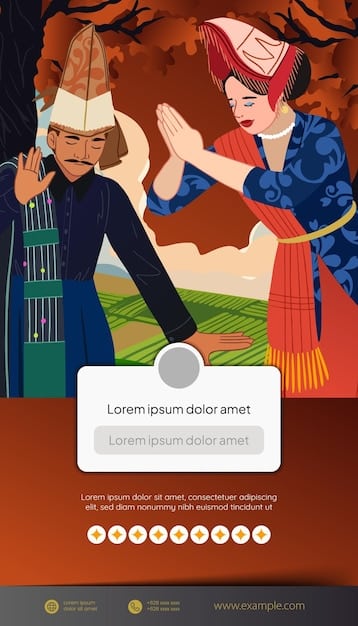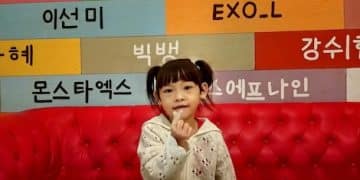Chinese Drama Slang 101: Learn & Impress Your Friends

Advertisements
Unlock the world of Chinese dramas by mastering essential slang! This guide covers popular phrases and internet terms, helping you understand nuances, impress fellow fans, and enhance your viewing experience. Dive into this cultural phenomenon with confidence and have more fun!
Ready to enhance your Chinese drama watching experience? Understanding the unique language used in these shows, especially internet slang, can significantly enrich your understanding and enjoyment. Let’s dive into Chinese Drama Slang 101: Master These Phrases and Impress Your Friends!
Anúncios
Decoding C-Drama Lingo: Why Slang Matters
Chinese dramas, or C-dramas, have exploded in popularity worldwide, offering a fascinating peek into Chinese culture, history, and modern life. However, like any cultural product, they come with their own set of linguistic nuances. Understanding slang is crucial for fully appreciating the jokes, emotions, and cultural references embedded within these dramas.
Beyond the Subtitles
Subtitles are a valuable tool, but they often fail to capture the full meaning of slang expressions. Slang is dynamic, evolving rapidly with new terms emerging constantly. Subtitles, constrained by space and translation limitations, may offer a simplified or even inaccurate interpretation. By learning common C-drama slang, you can:
Anúncios
- Gain a deeper understanding of character interactions and motivations.
- Appreciate subtle humor and cultural references.
- Enjoy the dramas in a more authentic and immersive way.
Internet Culture’s Influence
Much of C-drama slang originates from internet culture. China has a vast and vibrant online community that constantly generates new expressions, memes, and inside jokes. These terms quickly permeate popular culture, including television dramas. To truly understand C-dramas, you need to be familiar with these internet-born phrases.

Ultimately, learning C-drama slang unlocks a deeper layer of understanding and enjoyment, transforming the viewing experience from passive observation to active cultural engagement.
Essential Slang Phrases for C-Drama Newbies
Embarking on your C-drama journey requires equipping yourself with some foundational slang terms. These phrases are commonly used and provide a solid base for understanding more complex expressions. Here are a few must-know terms:
666 (liù liù liù)
This number sequence doesn’t have the negative connotations it might in Western cultures. In China, “6” (liù) sounds like “smooth” or “skilled.” Therefore, “666” is used to express admiration, praise, or approval. Think of it as the Chinese equivalent of “awesome” or “amazing.”
高富帅 (gāo fù shuài) / 白富美 (bái fù měi)
These terms describe the ideal partner. 高富帅 (gāo fù shuài) refers to a man who is tall, rich, and handsome. 白富美 (bái fù měi) describes a woman with fair skin, wealth, and beauty. These phrases often appear in romantic comedies and dramas focusing on relationship aspirations.
小鲜肉 (xiǎo xiān ròu)
Literally translating to “little fresh meat,” this term refers to young, attractive male celebrities, often with a focus on their youthful looks and charm. It’s a complimentary term commonly used by fans to describe their favorite actors.
- Usage: Observe how these terms influence character portrayals and plotlines. For instance, a protagonist striving to achieve “白富美” status or a character described as “小鲜肉” will likely face unique set of challenges and expectations.
- Beyond the Surface: While seemingly superficial, these terms reflect societal values and aspirations related to appearance, wealth, and success.
- Context is Key: The meaning of slang can evolve. Always consider the context in which it’s used.
Mastering these basic slang phrases will significantly improve your comprehension and allow you to appreciate the nuances within C-dramas.
Level Up Your Understanding: Intermediate Slang
Once you’ve grasped the basics, it’s time to expand your slang vocabulary with some intermediate terms. These phrases offer a deeper insight into Chinese internet culture and are frequently used in C-dramas to add humor and spice to the dialogue. Let’s explore some popular examples:
吃瓜 (chī guā)
This phrase literally means “eating melon.” However, in internet slang, it refers to being a passive bystander, someone who enjoys watching drama unfold without getting involved. Think of it as the equivalent of “grabbing popcorn” to watch the show.
给力 (gěi lì)
If something is described as “给力 (gěi lì),” it means it’s awesome, powerful, or supportive. It conveys a sense of strength and effectiveness. This phrase is often used to praise a character’s actions or express enthusiasm for a particular plot development.
Think of it as a versatile term of approval.”
CP (Couple Pairing)
Borrowed from English, “CP” stands for “couple pairing.” It refers to the romantic pairing of two characters in a drama that fans strongly support and ship. Discussions about “CPs” are a common part of C-drama online fandom.
These intermediate slang terms contribute to a richer understanding of character interactions, reactions to plot twists, and broader community discussions about C-dramas.
Expert-Level Lingo: Slang for the Seasoned Viewer
For the true C-drama aficionado, mastering advanced slang terms truly sets you apart. These expressions are often more nuanced, context-dependent, and deeply rooted in Chinese internet and pop culture. Let’s unravel some of these expert-level phrases:
YYDS (yǒng yuǎn de shén)
This initialism stands for “永远的神 (yǒng yuǎn de shén),” which translates to “eternal god.” It’s used to express the highest level of admiration and praise for someone or something, often implying that they are the best in their field or an unbeatable force.
凡尔赛 (fán ěr sài)
Derived from Versailles Palace, this term is used to describe someone who subtly brags or humblebrags about their wealth, achievements, or status. The term implies that the person is trying to appear modest while actually showing off.
躺平 (tǎng píng)
This phrase means “lying flat” and represents a growing social movement in China where young people are choosing to opt out of the rat race and embrace a more relaxed, less ambitious lifestyle. It signifies a rejection of societal pressures to constantly strive for success.
- Dramas often incorporate social commentary and explore themes related to societal pressures and individual desires.
- Cultural Significance: These terms provide insights into current social and cultural trends within China.
- Evolving Landscapes: Be prepared for slang to change over time. Stay updated by following online communities and observing how language is used in the latest seasons of trending dramas.
Understanding these more advanced terms offers a sophisticated perspective on C-drama storytelling and its reflection of contemporary Chinese society.
Beyond Words: Interpreting Body Language & Subtext
While mastering slang is essential, truly understanding C-dramas requires going beyond just the words themselves. Body language, facial expressions, subtext, and cultural context all play significant roles in conveying meaning. Here’s how to decipher these non-verbal cues:
Deciphering Gestures and Micro-expressions
Pay close attention to how characters move, their eye contact, and subtle changes in their facial expressions. A slight smile, a raised eyebrow, or a clenched fist can reveal a character’s true feelings even when their words say something different. These micro-expressions often convey underlying emotions and unspoken intentions.
Cultural Context Matters
Many C-dramas depict specific historical periods or cultural settings. Understanding the customs, values, and social norms of that era is crucial for interpreting character behaviors and motivations. Researching the historical background or cultural practices can significantly enhance comprehension.
Understanding Subtext
Subtext is the underlying message that is not explicitly stated but is implied through dialogue, actions, and body language. Skilled C-drama writers often rely on subtext to create tension, reveal hidden feelings, and add layers of complexity to the story. By paying close attention to what is *not* being said, you can uncover deeper meanings and appreciate the artistry of the storytelling.
By combining your knowledge of slang with careful observation of non-verbal communication and cultural context, you can achieve a more complete and nuanced understanding of C-dramas.
| Key Slang Term | Brief Description |
|---|---|
| 👍 666 (liù liù liù) | Expresses admiration, like “awesome!” |
| 🤩 高富帅 / 白富美 | Ideal man (tall, rich, handsome) / ideal woman (fair, rich, beautiful). |
| 😎 吃瓜 (chī guā) | “Eating melon” – being a passive observer of drama. |
| 💪 给力 (gěi lì) | Awesome, powerful, supportive. |
Frequently Asked Questions
What are some popular Chinese drama slang terms?
▼
Some popular terms include 666 (awesome), 高富帅/白富美 (ideal man/woman), 吃瓜 (watching drama unfold), 给力 (giving strength), and 小鲜肉 (young, attractive male celebrity). These are just a few examples to get you started.
▼
Engage with online C-drama communities, watch dramas with subtitles, and pay attention to how these terms are used in context. Online forums and social media groups are great resources.
▼
Slang usage can vary depending on the genre, target audience, and time period of the drama. Some terms are more common in modern dramas, while others may be specific to historical genres.
▼
Understanding slang enhances your overall viewing experience by allowing you to appreciate the nuances, humor, and cultural references that might be missed with literal translations. It helps you connect more deeply with the characters and storyline.
▼
Much of Chinese drama slang originates from internet culture. Due to China’s large community there are many trends and inside jokes. These terms quickly find themselves into every day life and even television.
Conclusion
By embracing the world of C-drama slang, you’ll unlock a new level of understanding and appreciation for these captivating shows. So go forth, explore these phrases, and impress your friends with your newfound knowledge! Happy watching!





